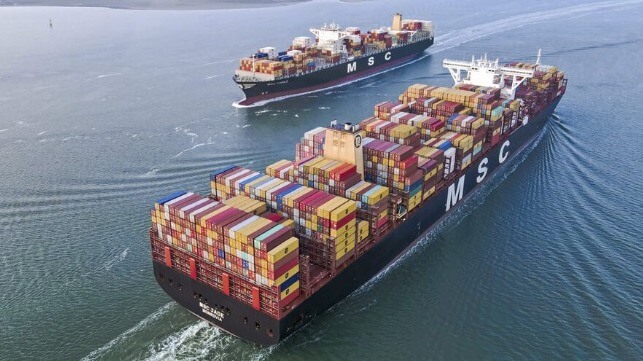FMC Warns Carriers Against Abuses Due Service Disruptions in Baltimore

The Federal Maritime Commission issued a statement on Friday warning carriers against taking advantage of the current disruptions in services due to the suspension of vessel traffic in the Port of Baltimore. The regulatory agency recognizes that many shippers are being forced to adjust supply chain operations while regular service at the Port of Baltimore is impacted by the collapse of the Francis Scott Key Bridge.
“Regulated entities are reminded that all statutes administered by the Federal Maritime Commission remain in effect. Common carriers and marine terminal operators (MTOs) must continue to comply with all statutory and regulatory requirements governing their operations,” they warned in today’s advisory.
In the hours and days after the incident, terminal operators highlighted that they were still open despite vessel traffic being suspended. On dock operations were continuing while shippers were being advised to suspend or reroute cargo. The terminals advised that they would stop receiving cargo but that they were open and continuing to process shipments at their terminals.
The FMC is specifically highlighting demurrage and detention fees, which continue to be one of the most contentious issues between carriers, terminals, truckers, and shippers. The FMC warns today that D&D fees “must be reasonable.” They are instructed that FMC regulations require demurrage and detention fees meet a reasonableness test of whether the charges serve as legitimate financial incentives to encourage cargo movement.
“Demurrage and detention invoicing must be lawful,” they warn. They are also providing details on how complaints can be filed.
The major carriers servicing the Port of Baltimore all issued alerts to customers while saying they were working with them to help with the disruptions. MSC, for example, issued its third update yesterday for customers reporting that vessels in the 2M Alliance would mostly be diverting containers to New York or in three cases Norfolk. They have advised shippers, that their cargoes “will be declared terminated at this alternate port and storage, D&Ds and on-carriage costs to the initially intended destination will be for the sole cargo’s account.”
CMA CGM also declared a Force Majeure at the end of March for all shipments to and from Baltimore. They also said that CMA CGM's bill of lading will terminate for inbound cargo at the diversion port.
“We understand your need for clarity on your cargo, as well as future changes to our routes regarding Baltimore,” Maersk said in a customer advisory issued on April 3. “We are working diligently to identify solutions and will inform you as soon as possible of changes to current and future cargo to Baltimore.”
Maersk also asked customers who are making their own arrangements for their Baltimore cargo to notify representatives so that we can update their systems and operational plans. At the same time, they asked customers who had import cargoes into both Newark and Norfolk to arrange to pick up your containers as soon as possible to assist with increased flows of containers.
FMC Investigation Calls for MSC to Pay $63M for Shipping Act Violations

The Office of Enforcement of the Federal Maritime Commission is calling for a whopping $63.3 million civil penalty against MSC Mediterranean Shipping Company due to its “unreasonable and unjust actions and inactions in violation of the Shipping Act of 1984.” The recommendation comes after a more than six-month investigation into the shipping giant and its agents' billing practices.
The investigation was ordered in August 2023 after years of complaints from shippers about abuses by the large carriers. During the pandemic and the resulting surge in cargo volumes, shippers loudly complained about the business practices of the carriers. The concentration of the shipping industry into the hands of a small number of carriers and the potential abuses were at the core of the 2022 reforms to the Shipping Act.
The FMC’s investigators concluded their discovery exploring the billing practices of MSC at the beginning of February and yesterday filed their 87-page report to an administrative law judge at the FMC. Discussing what it believes are the violations of the Shipping Act, the Office of Enforcement writes, “At the core of this proceeding is MSC’s billing practices that resulted in MSC unjustly profiting at the expense of its customers.”
The order for the investigation mapped out a range of issues including third-party billing for companies that might not have been directly a part of the bill of lading, tariffs and fees for nonoperating refrigerated containers (reefers), how rates were published, and if they were following the published rates as well, as exploring how penalties should be assessed if they found violations.
The report concludes that MSC knowingly and willfully employed unreasonable and unfair practices that did not promote economic ocean commerce. They cite an ongoing practice of a broad definition for “merchant” used to invoice charges to third parties, as well as incorrectly billing for non-operating reefers and a failure to publish rates for those containers.
“For years, MSC used its market power and wielded heavy-handed tactics to define standard bill of lading terms such as “merchant” to justify billing non-consistent and non-contracting third parties detention and demurrage,” the report concludes. They detail 18 specific violations and using the schedules established in the Act, set the penalty per violation adjusted for inflation at over $73,000 or a total of $1.3 million.
The largest number of violations is identified for overcharging for non-operating reefers, where they cite over 2,600 examples with a penalty of over $17,600 per or a proposed total of over $46 million. They also cite nearly 800 examples of failure to publish rates for those containers with a fine of $19,600 per or a total of over $15.6 million.
The investigation justifies the penalties, which total $63.3 million, reporting that the practices were followed “in the pursuit of higher profits.” They report that MSC when confronted by customers did issue refunds but never proactively undertook any action to “return millions of dollars in overcharges.” They report that MSC participating in the discovery indicated it was not possible to review each invoice.
The Office of Enforcement highlights that the Shipping Act calls for civil penalties that are significant to deter and mitigate behaviors. The Act also provides for issuing an appropriate cease and desist order which they recommend is warranted in this case.
MSC has not yet filed a response. Undoubtedly, there will be appeals, but it highlights the claims of shippers regarding the actions of carriers as they have grown larger and consolidated the market.
No comments:
Post a Comment